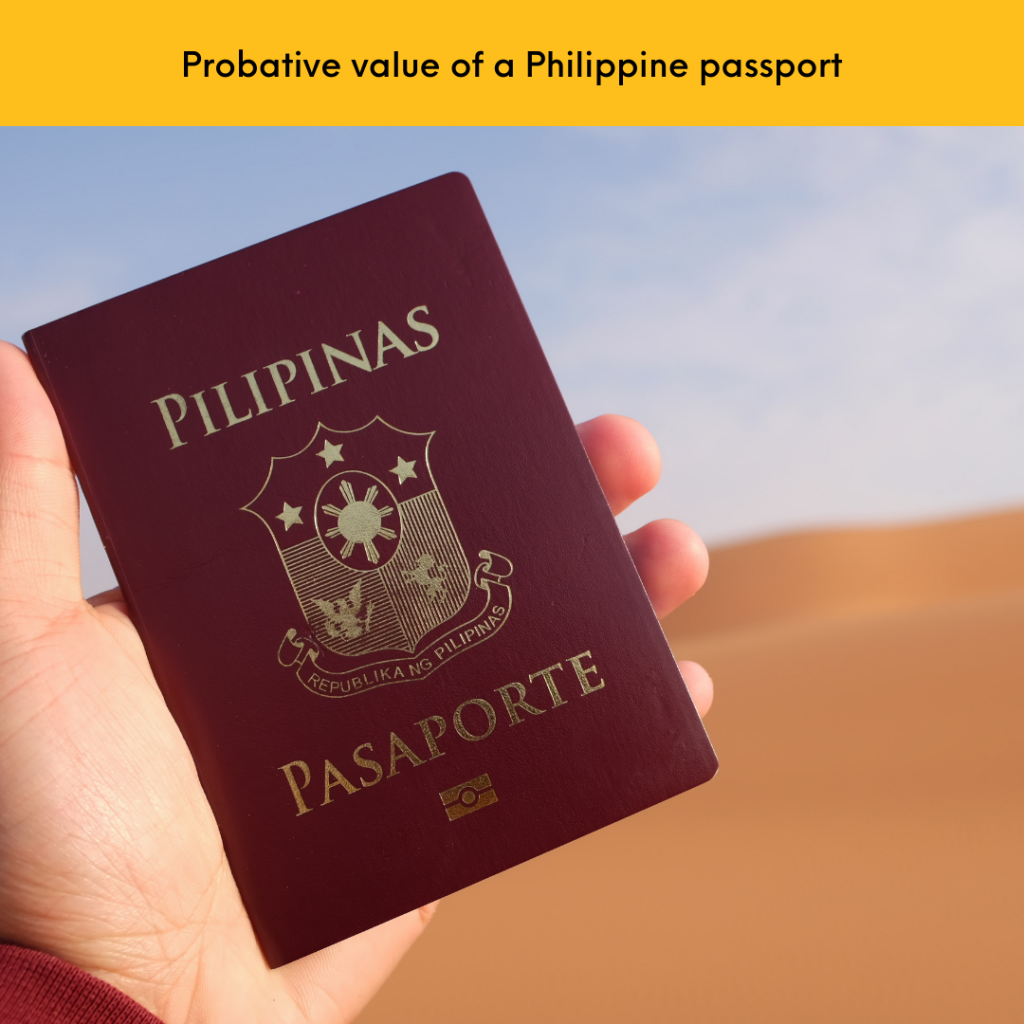
Published 21 January 2022, The Daily Tribune
Will a Philippine Passport suffice to prove one’s Filipino citizenship? This was answered by the Supreme Court (SC) in the case of Uy-Belleza vs The Civil Registrar of Tacloban City, G.R. 218354. 15 September 2021.
The case refers to a Petition for Correction of Entry in the Civil Registry before the Regional Trial Court (RTC) filed by Sheila Marie G. Uy-Belleza (petitioner), seeking the correction of the entry in her birth certificate stating that the nationality of her mother Adelaida Go Uy (Adelaida) is “Chinese” instead of “Filipino.”
The RTC granted the petition and ordered the correction of her mother’s nationality in her birth certificate.
Dissatisfied, the Office of the Solicitor General (OSG) filed a Motion for Reconsideration contending that the totality of the evidence presented by the petitioner did not prove that her mother is a Filipino citizen. Accordingly, other than the bare allegation of Adelaida that she was the illegitimate daughter of a Chinese father and a Filipino mother, there was no other evidence presented to prove this claim. In dismissing the Motion for Reconsideration, the trial court gave weight to the Philippine passport and voter’s certification issued to Adelaida to prove her citizenship. The RTC likewise noted that passports are not indiscriminately issued by the Department of Foreign Affairs without proof of Filipino citizenship.
On appeal, the OSG contended, among others, that a Philippine passport is insufficient to prove Adelaida’s citizenship considering that she did not submit a birth certificate when she submitted her application but merely executed an affidavit. Neither can a voter’s certification prove Filipino citizenship since an exercise by a person of the rights and/or privileges granted to Filipino citizens is not conclusive proof of Filipino citizenship.
The Court of Appeals reversed the decision of the RTC. In ruling that the appellee had satisfactorily proven her mother Adelaida’s citizenship as a Filipino, the trial court gave much weight to the fact that she was issued a Philippine passport. Careful scrutiny of the records of this case however reveals that Adelaida herself testified that she merely executed an affidavit for the purpose of securing a passport. The propriety and legality of the issuance of the Philippine passport to Adelaida on the basis of a mere affidavit is beyond the cognizance of the Court.
Petitioner, unhappy with the reversal, brought the case before the SC.
The SC found the petition meritorious, ruling that the petitioner was able to sufficiently establish her petition for correction of entry as to her mother Adelaida’s citizenship.
“First, Adelaida was issued a Philippine passport, the genuineness, and authenticity of which was not disputed at all by the OSG.
A passport is “a document issued by the Philippine government to its citizens requesting other governments to allow its citizens to pass safely and freely, and in case of need, to give him/her all lawful aid and protection.” It is an official document of the identity of Philippine citizenship of the holder issued for travel purposes. A passport proves that the country which issued it recognizes the person named therein as its national. In fact, the very first page of a Philippine passport explicitly recognizes the bearer as its citizen. It states:
The Government of the Republic of the Philippines requests all concerned to permit the bearer, a citizen of the Philippines, to pass safely and freely and, in case of need, to give him/her all lawful aid and protection. (Emphasis supplied)
The government’s issuance of a Philippine passport to Adelaida in effect is a recognition of her Filipino citizenship.
The fact that Adelaida merely executed an affidavit when she applied for a passport, instead of submitting a birth certificate, will not overturn the presumption of regularity in its issuance. To successfully overcome such presumption of regularity, case law demands that the evidence against it must be clear and convincing. Absent the requisite quantum of proof to the contrary, the presumption stands deserving of faith and credit.
Second, the certificate of live birth of the petitioner’s brother also stated the citizenship of Adelaida as “Fil.” Hence, to disallow the correction in the petitioner’s birth record of her mother’s citizenship would perpetuate an inconsistency in the natal circumstances of the siblings who are unquestionably natural children of the same mother and father.
Lastly, the testimony of Adelaida regarding her illegitimacy and the citizenship of her mother, Teodora Guinto, was never questioned by the prosecutor.
For more of Dean Nilo Divina’s legal tidbits, please visit www.divinalaw.com. For comments and questions, please send an email to cabdo@divinalaw.com.

